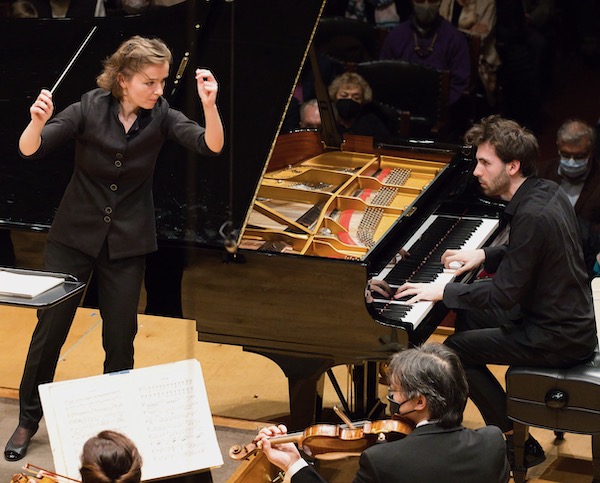Boston Symphony program takes flight with two notable debuts

Alexandre Kantorow performed Tchaikovsky’s Piano Concerto No. 2 with Anna Rakitina conducting the Boston Symphony Orchestra Thursday night at Symphony Hall. Photo: Hilary Scott
Rarely do the stars align so neatly for a Boston Symphony Orchestra concert as they did on Thursday night at Symphony Hall.
On the one hand, there was the program: Piotr Tchaikovsky’s knuckle-busting Piano Concerto No. 2—not played by the BSO at Symphony Hall since 1912—and Jean Sibelius’s luminous Seventh Symphony framing a curtain-raiser by Pulitzer Prize-winner Ellen Reid.
Then there was the subscription series debut of Anna Rakitina. One of the BSO’s two assistant conductors, Rakitina isn’t exactly unknown in these parts: she led one of the orchestra’s digital concerts during the pandemic-altered 2020-21 season and appeared with the Boston Symphony Chamber Players earlier this year.
But her reputation has soared recently thanks to a series of well-received appearances, both previously scheduled and as a last-minute substitute, with orchestras around the country. This week, Boston finally got to see what all the fuss is about.
Suffice it to say, there’s much about which to be impressed. Possessing a clear beat, a keen ear, and a strong feel for musical structure, Rakitina drew playing of noteworthy responsiveness from the BSO throughout the evening.
In Reid’s When the World as You’ve Known It Doesn’t Exist, she highlighted the music’s bold contrasts of character without overdoing its moments of dynamic excess, particularly during the music’s pummeling climax.
Commissioned as part of the New York Philharmonic’s Project 19 initiative, When the World traces an arc that begins in anger and confusion but resolves in tentative acceptance. Accordingly, the musical fabric is constantly varied: sometimes airy and cloudy, sometimes crunching and pulsing violently, it compresses much into its ten minutes.
Reid’s prismatic scoring includes a trio of female voices—on Thursday the pure-toned ensemble of sopranos Eliza Bragg, Martha Cluver, and Estelí Gomez—who blend, sometimes unsettlingly, with the instrumental forces. While it’s an open question whether or not When the World’s lyrical apotheosis is fully earned, the gesture does linger. That it did so despite being paired with a flowing, energetic account of Sibelius’s Symphony No. 7, says something.
Completed in 1924, Sibelius’s last symphony is perhaps his most challenging to conduct. Though cast in a single, twenty-minute movement, the piece is divided into numerous subsections, all of which must somehow cohere, tempo-wise and expressively.
Rakitina’s overall vision of the piece last night was dynamic: tempos were fresh, phrasings flexible, and the BSO’s collective tone both nicely weighted and colored. Periodically her preference for speed resulted in blurry textures and rhythmic imprecision.
Even so, this was a vigorous, lived-in-the-moment interpretation. The music danced, balances were carefully controlled, and transitions unfolded naturally. Crucially, all the epochal low brass entrances were true musical events, from the apex of the opening chorale to the Symphony’s cathartic resolution. The string playing in the closing pages, shimmered with intensity.
Afterwards, Rakitina held the audience—which seemed particularly engaged in the performance—in silence for a good ten seconds after the last chord faded.
No such sobriety ruled after the raucous ending of Tchaikovsky’s Piano Concerto No. 2. Premiered in 1881, the Second Concerto has never been so popular as the same composer’s First, though not for want of technical fireworks. To be sure, this is music whose virtuosity is rivaled only by that of Liszt and Busoni.
Not that pianist Alexandre Kantorow was fazed by any of the concerto’s knotty complexities. Making his BSO debut, the twenty-four-year-old French keyboardist tackled the work in its complete, unsimplified original version, gamboling through its thickets with an effortlessness that astonished. Rich and mighty, his reading was also consistently supple and poetic, not once getting sidetracked by the music’s occasionally discursive architecture.
And yet Kantorow’s performance was noteworthy for its rhapsodic approach to phrasing and overriding forward momentum. Everything moved smartly, from the first movement’s lyrical subject to the finale’s snapping second theme (which was taken at a hurtling clip).
In the latter, though, Rakitina’s beat was perfectly steady and, whenever the reading threatened to derail, she ensured it didn’t. Here, and in the other movements, the conductor was fully in control of the accompaniment: the BSO’s entrances were always well-paced and full-bodied but Kantorow was never covered. Indeed, the rapport between soloist, ensemble, and conductor was nowhere more beautifully illustrated than in the second movement’s enchanting apex in which solo violin, cello, and piano were flawlessly balanced with the orchestra.
Afterwards, Kantorow offered a pair of encores: an exquisitely-balanced account of Giovanni Sgambati’s setting of Gluck’s “Melody” from Orpheus and Eurydice; and Guido Agosti’s Technicolor arrangement of the “Finale” from Stravinsky’s The Firebird.
Given the chutzpah it took to trot out the last while sitting, surrounded, by the BSO onstage at Symphony Hall, one hoped that Rakitina would return to lead the ensemble in the original version in a kind of friendly play-off. That didn’t happen but, perhaps, it’s best to save something for these musicians’ subsequent engagements in Boston. After last night, both have earned return invitations.
The program will be repeated 1:30 p.m. Friday and 8 p.m. Saturday at Symphony Hall. bso.org
Posted in Performances